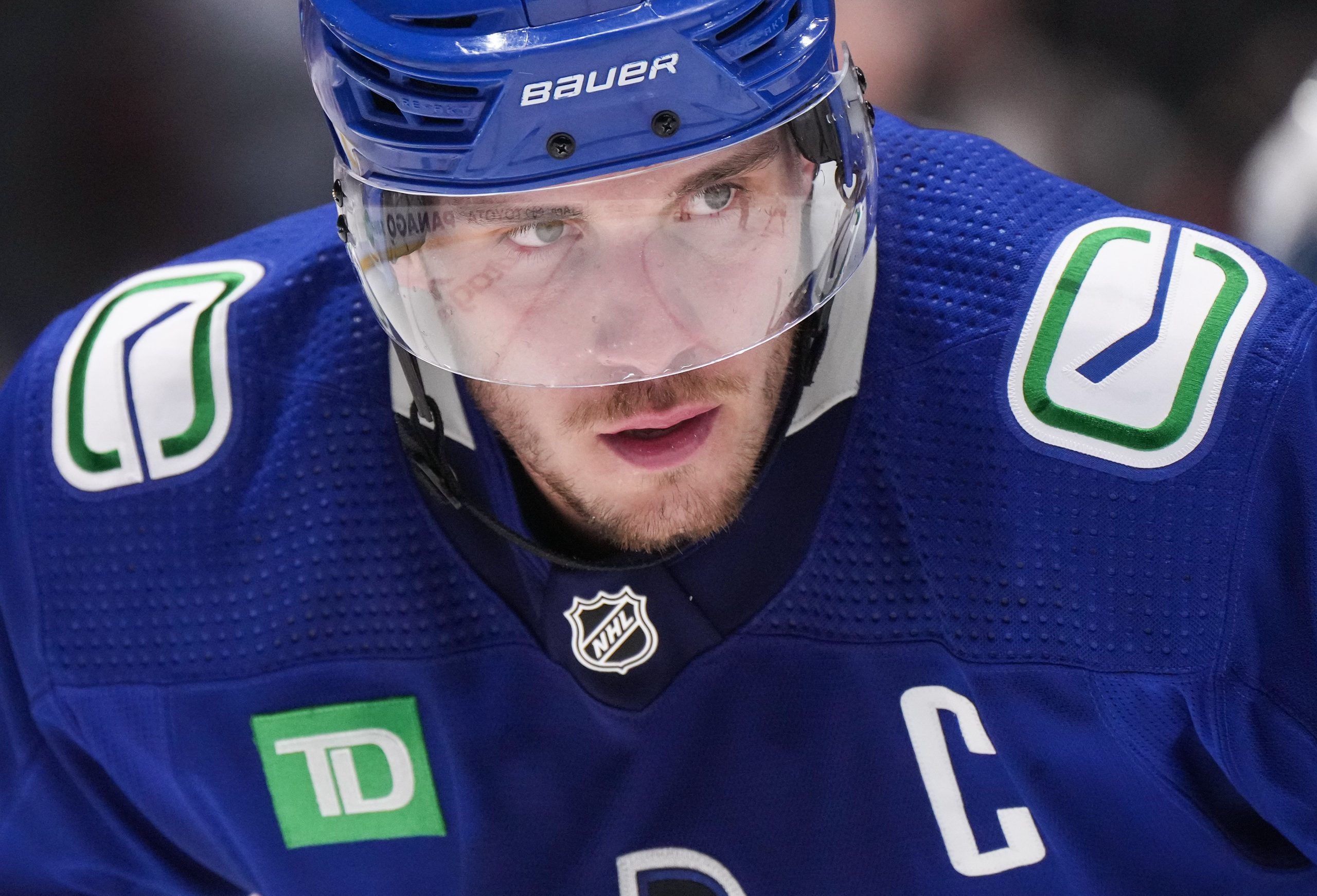Any team that moves their captain is making a choice. But the Vancouver Canucks trading Bo Horvat has one big effect that fans might not have considered.
The Trouble With Trading Bo Horvat
There was one thing on every Vancouver fan’s mind in the 2022 off-season. How much was J.T. Miller going to bring in return when he gets traded? To say his re-signing to a seven-year, $56 million deal was a surprise undersells it considerably. That he was signed before the presumably easier Horvat just added to the shock.
After a moment, though, the reasoning was clear. Miller was signed before Horvat because his deal was probably going to be harder to consummate. Horvat clearly loves being in Vancouver, is the captain, and isn’t coming off a 99-point year. Miller’s 217 points in 202 games was unmatched, even by Elias Pettersson. That deal was going to be a big one, and Horvat’s could fit into the remaining cap space somehow. He wouldn’t get full-market value, but something would get done. Money goes to the scorers, after all.
Which, ah, might be a philosophy that doesn’t quite work out like the team’s management hoped.
Horvat’s Cost
Trading Bo Horvat is going to leave the team with a void, both on and off the ice. Obviously, his scoring is just insane this season – 16 goals in his first 20 games isn’t what anyone expected. Those are Cy Young numbers, probably brought on by his being more selfish on the ice. And we say that as a good thing.
Horvat’s play on the ice has been nearly altruistic through the years. He put in goals, certainly, but usually when he was the last option available or as part of a set play. Breakaways, his spot as the bumper option, in scrums where whoever reaches the puck is going to shoot. Those were Horvat’s goals. Otherwise, he was looking to pass and he is pretty good at it – whether his wingers could finish or not was unconsidered. This year, with what is clearly a contentious negotiation happening, Horvat is finishing. Lots.
Then there are all the off-the-ice responsibilities as the captain of the Canucks. It’s an extensive list, as the team maintains an outsized presence in the city. Horvat is exemplary in that aspect as well, and while that has to be valued by anyone who plans on trading for him it should be more so by the team he’s on.
Losing the Plot
But staying on the ice, there is a major issue with trading Bo Horvat away from Vancouver. Combined with the signing of Miller, what the heck is management doing next?
The plan, obviously, was to make the playoffs this year, stabilize the team long-term, and add pieces at better price points. The process has been started at forward but will take a while on the defence. Every management member on the team has that objective on their office whiteboard. Miller was signed to be a core part of a team that was starting to compete this year and improving from there. If that came at the cost of trading Bo Horvat, so be it.
The one problem with the plan is that the team needs to compete this year and improve from there. In case you missed it, that hasn’t happened. Pretty much the opposite of Step One has happened instead, with the Canucks stumbling badly the instant they stepped on the ice.
Step Three: Profit!
In the discussion of possible Horvat deals lie hints of management’s reasoning at the beginning of the year. There is a lot of talk about how valuable the centre position is to teams, and Horvat is an excellent one. Even when his scoring comes back to Earth, he’ll probably remain a 60- to 65-point, top-two centre for a few years yet. And his faceoff acumen is right at the top of the league, making him a premium situational player.
The decision was made not to do a strip-down and rebuild because of the Canucks because of their depth at centre. That is, in large part, why they re-signed Miller instead of moving him. But Miller, unfortunately, isn’t a particularly good centre. The centre position involves a lot more than scoring points, including defensive responsibility which can mean sacrificing some offence. Miller didn’t struggle, exactly, but at $8 million per season, he needs to help Vancouver win.
As the blown leads and outright losses stacked up, coach Bruce Boudreau moved him back to the wing. Boudreau also started keeping him off the ice late in games, especially as Pettersson’s defensive awareness improved. A player the coach doesn’t trust can’t be a cornerstone of a team – but that was the plan if Horvat got moved.
Hard Rock Place
So now the team is looking at the possibility of trading Bo Horvat, but Miller hasn’t shown he can replace him. If Horvat gets moved, the team will have a hole at centre once again. For obvious reasons, Vancouver won’t get a player of equal value in return. In dropping Horvat for prospects and/or draft picks, the Canucks would signal, if not a rebuild, at the very least a pause. They’ll need to wait for those picks or something like them to develop. This means signing Miller through 2029-30 was a pointless maneuver.
The entire idea of giving Miller that extensive – and expensive – deal was so the team would get his best years when they were ready to compete. So the becomes an overpaid Wily Veteran* in the back half of the deal – every team has one of those. Most longer playoff runs have some 34-year-old unexpectedly putting in three game-winning goals in one series. Makes for a good story!
But with Horvat gone, the team removes one of their strongest positions. Miller’s best years could be spent waiting for another three seasons before the team even makes the playoffs. And that can’t have been in anyone’s plans.
* All veterans are wily
Bo Horvat scores his 15th goal of the season, trailing only Connor McDavid for the NHL lead (16). Only 2 players have scored more goals through the #Canucks first 19 games of a season:
Pavel Bure (1992-93) – 20
Tony Tanti (1983-84) – 19 pic.twitter.com/cFuFTNOKwe— Sportsnet Stats (@SNstats) November 22, 2022






